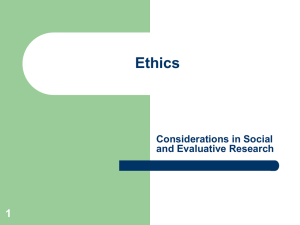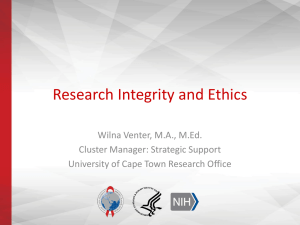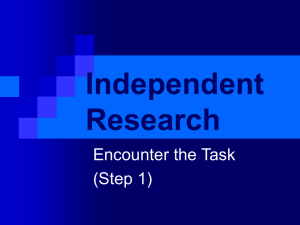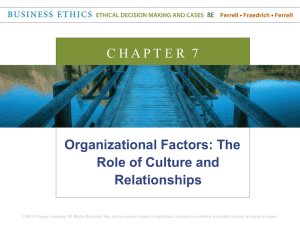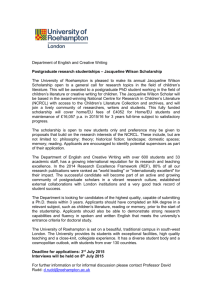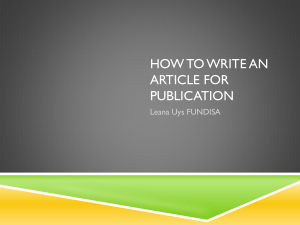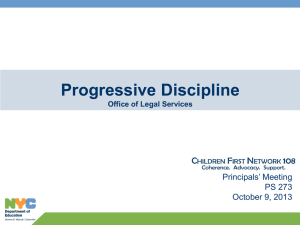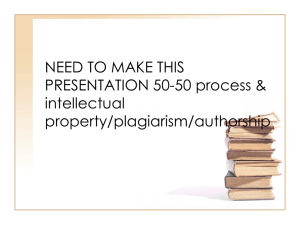Code of Good Research Practice
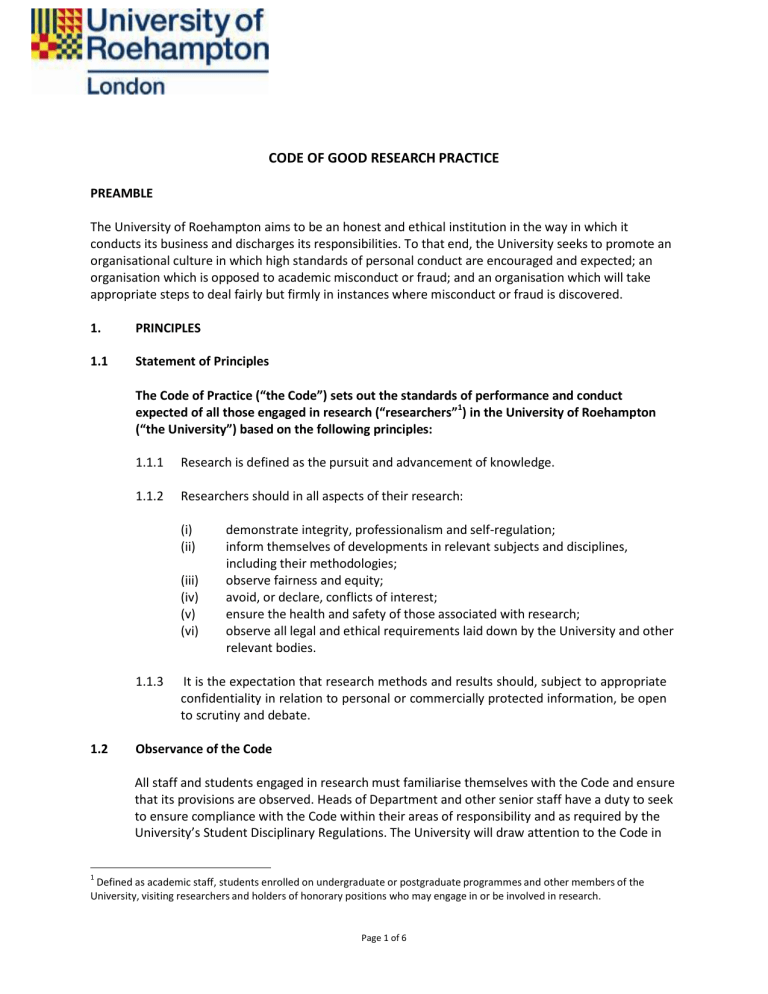
CODE OF GOOD RESEARCH PRACTICE
PREAMBLE
The University of Roehampton aims to be an honest and ethical institution in the way in which it conducts its business and discharges its responsibilities. To that end, the University seeks to promote an organisational culture in which high standards of personal conduct are encouraged and expected; an organisation which is opposed to academic misconduct or fraud; and an organisation which will take appropriate steps to deal fairly but firmly in instances where misconduct or fraud is discovered.
1. PRINCIPLES
1.1 Statement of Principles
The Code of Practice (“the Code”) sets out the standards of performance and conduct expected of all those engaged in research (“researchers”
1
) in the University of Roehampton
(“the University”) based on the following principles:
1.1.1 Research is defined as the pursuit and advancement of knowledge.
1.1.2 Researchers should in all aspects of their research:
(i)
(ii) demonstrate integrity, professionalism and self-regulation; inform themselves of developments in relevant subjects and disciplines, including their methodologies;
(iii) observe fairness and equity;
(iv) avoid, or declare, conflicts of interest;
(v) ensure the health and safety of those associated with research;
(vi) observe all legal and ethical requirements laid down by the University and other relevant bodies.
1.1.3 It is the expectation that research methods and results should, subject to appropriate confidentiality in relation to personal or commercially protected information, be open to scrutiny and debate.
1.2 Observance of the Code
All staff and students engaged in research must familiarise themselves with the Code and ensure that its provisions are observed. Heads of Department and other senior staff have a duty to seek to ensure compliance with the Code within their areas of responsibility and as required by the
University’s Student Disciplinary Regulations. The University will draw attention to the Code in
1
Defined as academic staff, students enrolled on undergraduate or postgraduate programmes and other members of the
University, visiting researchers and holders of honorary positions who may engage in or be involved in research.
Page 1 of 6
its induction processes for newly appointed staff and students. Supervisors of students engaged in research will seek to ensure compliance with the Code on the part of such students.
1.3 Breach of the Code
Failure to comply with the provisions of the Code may be grounds for action to be taken by the
University, including disciplinary procedures.
1.4 Advice
2.
Where a researcher is in doubt about the applicability of the provisions of the Code, or about the appropriate course of action to be adopted in relation to it, advice should be sought from the appropriate Head of Department, head of the departmental research advisory group or the
Deputy Provosts.
GOOD RESEARCH PRACTICE
2.1 Good research practice includes the following:
fundamentals of research work such as: maintaining professional standards; documenting results; questioning one’s own findings; attributing and acknowledging appropriately and honestly the work of others;
leadership and co-operation in research groups;
taking into account the needs of new researchers;
securing and storing primary data.
2.2 These elements to ensure good research practice are expanded on in this
Code and attention is drawn to the related University documents, e.g.:
Ethics Guidelines which can be found at http://www.roehampton.ac.uk/uploadedFiles/Pages_Assets/PDFs_and_Word_Docs/Ethics/
Ethics-Application-Guidelines.doc
The Research Degrees Handbook which can be found at http://www.roehampton.ac.uk/Courses/Graduate-School/Current-Students/
Health and Safety Policy: http://www.roehampton.ac.uk/uploadedFiles/Pages_Assets/PDFs_and_Word_Docs/Policies
/Health-and-Safety-Policy.pdf
Intellectual Property Policy http://www.roehampton.ac.uk/uploadedFiles/Pages_Assets/PDFs_and_Word_Docs/Policies
/Intellectual-Property-Policy.pdf
Diversity and Equal Opportunities Policy: http://www.roehampton.ac.uk/Corporate-Information/Diversity-and-Equal-Opportunities/
Student Disciplinary Regulations
2.3 Health and Safety
Page 2 of 6
All research must be carried out in a manner that complies with the Health and Safety at Work
Act (1974), the Safety Regulations approved under this Act and the University’s Health and
Safety Policy. Department safety procedures and handbooks will detail local safety rules which must be obeyed. Advice on health and safety issues can be obtained from the University’s
Health and Safety Office
2.4 Purchasing and Expenditure for Research
Purchasing and expenditure of funds should take place in accordance with the terms and conditions of any grant or contract held for the research and the University’s Financial
Regulations. Advice on compliance with the Financial Regulations should be sought from the
PVC and Director of Finance.
2.5 Professional Standards
It is important that a culture of professionalism towards research is fostered and maintained in the University. At the heart of all research, regardless of discipline, is the need for researchers to adopt and promote in others high standards of personal conduct, and to be honest and ethical with regard to their own actions, and in their responses to the actions of other researchers. The adoption of a professional approach applies to the whole range of research work, including methodological and experimental design, the generation and analysis of data, the publication of results, and the appropriate acknowledgement of the direct and indirect contributions of colleagues, collaborators and others.
2.6 Leadership
The creation of a sound research climate is essential to good research practice. Within a research group, responsibility for creating such a climate lies with the group leader. Group leaders and other senior researchers should create a research environment of mutual co- operation, in which all researchers are encouraged to develop their skills and in which the open exchange of research ideas is fostered. They must also ensure that appropriate direction of research and supervision of researchers are provided.
2.7 Data Collection and Retention
(i) Research data must be recorded accurately (where appropriate, signed and dated by the Investigator) and in a durable and auditable form, with appropriate references so that it can be readily recovered.
(ii) Research data must normally be retained intact for a period of at least ten years from the date of any publication which is based upon it. Researchers should be aware that specific professional bodies and research councils may require a longer period of data retention.
(iii) It is the duty of the principal investigator in any research project to comply with the regulations of the current Data Protection Act in force from time to time and to ensure that copyright, a third party’s intellectual property rights and confidentiality are not breached.
Page 3 of 6
(iv) Specific arrangements should be made to protect the security of research data where there is a contractual or ethical requirement to do so.
(v) In general, academic enquiry and debate require openness but confidentiality provisions relating to publication may apply in circumstances where the University or the researcher has made or given confidentiality undertakings to third parties, confidentiality is required to protect intellectual property rights or required pursuant to provisions to relevant legislation such as the
Data Protection Act. It is the obligation of the researcher to ascertain whether confidentiality provisions apply and of the Head of Department to inform researchers of their obligations with respect to these provisions.
2.8 Publications
(i) Dissemination of knowledge is one of the objectives of the University.
(ii) A publication must report research and research findings accurately.
(iii) A publication must contain acknowledgement to all who have made a significant contribution to the relevant research, who are not authors.
(iv) Any person who has participated in a substantial way in conceiving, executing or interpreting a significant part of the relevant research should be given the opportunity to be included as an author of a publication derived from that research.
(v) Any person who has not participated in a substantial way in conceiving, executing or interpreting a significant part of the relevant research should not be included as an author of a publication derived from that research.
2.9 Conflicts of Interest
(i) A researcher must make full disclosure of any potential or actual conflict of interest in research. Conflict of interest includes but is not restricted to personal or close family affiliation to or financial involvement with any organisation sponsoring or providing financial support for a project undertaken by a researcher.
(ii) Disclosure of a personal conflict of interest in research must be made to the Head of
Department as soon as reasonably possible.
2.10 Submitting Proposals
(i) In applications for funding, Principal Investigators should take all reasonable measures to ensure accuracy of information and compliance with the University’s required procedures. The procedures for submitting an application for research funding can be found at the following address: http://ws1.roehampton.ac.uk/research-and-business-
Page 4 of 6
development/services-for-research-and-enterprise-staff/bids-and-grant- support/index.html
3. ETHICAL AND LEGAL REQUIREMENTS
3.1 Any special standards of work performance and ethical conduct imposed by law, Research
Councils, other funders of research, professional or statutory bodies or by the University in relation to particular categories of research are deemed to be included in this Code in its application to staff and students engaged in that research in the University. In addition, compliance with the University’s Ethics Guidelines and the guidelines of appropriate external
Ethical Committees is also essential.
3.2 Experimentation on animals is strictly controlled by the Home Office and can only be conducted by licensees in accordance with the Animals (Scientific Procedures) Act of 1986.
4. MISCONDUCT AND ALLEGATIONS OR COMPLAINTS OF MISCONDUCT
4.1 The University defines academic misconduct or academic fraud in the research context as committing an act whereby the researcher knowingly and deliberately seeks to corrupt, misrepresent or falsify the outcomes of academic and/or professional study, scholarship and/or research. Academic misconduct or fraud, as they relate to research, include but are not limited to:
(i)
(ii) misrepresentation of the work or expressed thoughts of others as one’s own without permission or acknowledgement (plagiarism);
-
- fabrication of:
- the results of work which he/she falsely claims to have undertaken (for example, experiments, interviews, observations or other forms of research and investigation);
- results which he or she has not obtained; results by omission from analysis and publication of selected components of a data set; research dissemination (for example: false claims of publication of work).
(ii) deliberate exploitation of ideas and concepts of others without acknowledgement;
(iv) cheating or otherwise disclosing information with the intent of gaining for oneself or for another an unfair advantage;
(v) intentional damage to, or removal of, the research-related property of another;
Page 5 of 6
(vi) intentional non-compliance with the terms and conditions governing the award of external funding for research or with the University’s policies and procedures relating to research, including accounting requirements, ethics, and health and safety regulations.
4.2 The procedures relating to discipline of students for misconduct in the prosecution of research, are set out in the Student Disciplinary Regulations (the “Regulations”). Any allegation or complaint of academic misconduct or fraud in research will be investigated and dealt with under those Regulations.
4.3 Victimisation or reprisals against a person making in good faith an allegation of misconduct will be regarded as a disciplinary offence and handled in accordance with the Regulations. Similarly, vexatious, malicious or frivolous allegations of misconduct made by members of staff or students will be regarded as a disciplinary offence.
5. EXTERNAL CODES
5.1 In addition to its own Code, the University requires those engaged in research in an area to be fully aware of and in compliance with the appropriate external protocols and statements governing research activity. The following list is indicative, but is not intended to be exhaustive:
(i)
(ii)
Research Councils - Joint Statement on Safeguarding Good Scientific Practice;
Medical Research Council - Good Research Practice Guidelines;
(iii) Economic & Social Research Council - Safeguarding Good Scientific Practice (Research
Funding Guide April 2008 Annex B)
(iv) The Wellcome Trust Guidelines on Good Research Practice and Statement on the
Handling of Allegations of Research Misconduct
(v) NHS Research Governance Framework for Health and Social Care: Second Edition
(vi) Economic & Social Research Council Research Ethics Framework
Page 6 of 6
